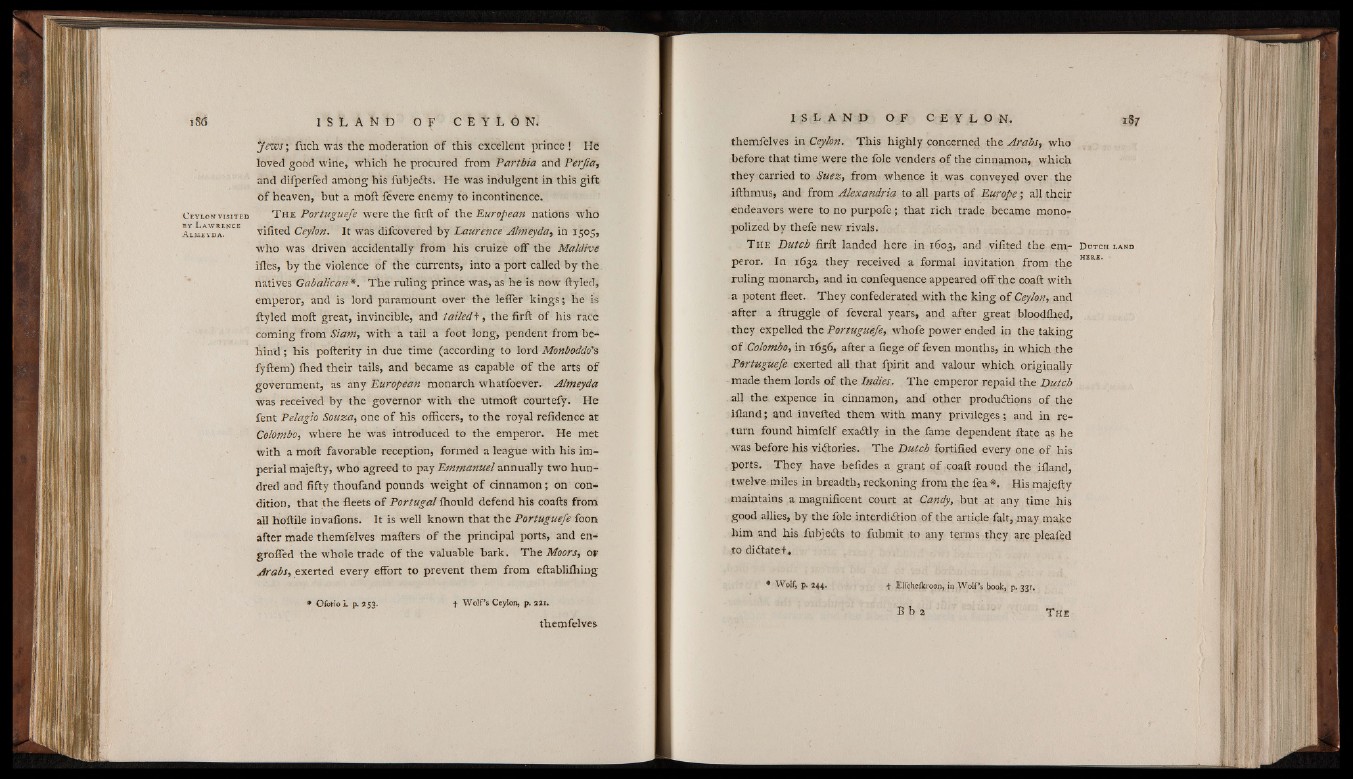
C e y l o n v i s i t e d
s y L a w r e n c e
A l m e y d a .
Jews; fuch was the moderation o f this excellent prince ! He
loved good wide, which he procured from Partbia and Perjia,
and difperfed among his fubjets. He was indulgent in this gift
o f heaven, but a moil levere enemy to incontinence.
T h e Portuguefe were the firft of the European nations who
vifited Ceylon. It was difcovered by Laurence Almeyda, in 1505,
w'ho was driven accidentally from his cruize off the Maldive
ifles, by the violence of the currents, into a port called by the
natives Gabalican *. The ruling prince was, as he is now ftyled,
emperor, and is lord paramount over the leffer kings; he is
ftyled moll great, invincible, and tailed +, the firft of his race
Coming from Siam, with a tail a foot long, pendent from behind
; his pofterity in due time (according to lord Monboddo's
fyllem) Ihed their tails, and became as capable o f the arts of
government, as any European monarch whatfoever. Almeyda
was received by the governor with the utmoft courtefy. He
fent Pelagio Souza* one o f his officers, to the royal refidence at
Colombo, where he was introduced to the emperor. He met
with a moil favorable reception, formed a league with his imperial
majefty, who agreed to pay Emmanuel annually two hundred
and fifty thoufand pounds weight o f cinnamon; on condition,
that the fleets o f Portugal Ihould defend his coafts from
all hoftile invafions. It is well known that the Portuguefe foon
after made themfelves mailers o f the principal ports, and en-
groffed the whole trade o f the valuable bark. The Moors, or
Arabs, exerted every effort to prevent them from eitablifhiug
* Oforio i. p. 253. f W o lf’ s Ceylon, p. 221..
themfelves
themfelves in Ceylon. This highly concerned the Arabs, who
before that time were the foie venders o f the cinnamon, which
they carried to Suez, from whence it was conveyed over the
ifthmus, and from Alexandria to all parts of Europe; all their
endeavors were to no purpofe; that rich trade became monopolized
by thefe new rivals.
T h e Dutch firft landed here in 1603, and vifited the em- D u t c h l a n d
peror. In 1632 they received a formal invitation from the HiRE’
ruling monarch, and in confequence appeared off the coaft with
a potent fleet. They confederated with the king of Ceylon, and
after a ftruggle of feveral years, and after great bloodihed,
they expelled the Portuguefe, whofe power ended in the taking
of Colombo, in 1656, after a fiege of feven months, in which the
Portuguefe exerted all that fpirit and valour which originally
made them lords of the Indies. The emperor repaid the Dutch
all the expence in cinnamon, and other productions of the
ifland; and invefted them with many privileges; and in return
found himfelf exactly in the fame dependent Hate as he
was before his victories. The Dutch fortified every one of his
ports. They have befides a grant o f coaft round the ifland,
twelve miles in breadth, reckoning from the fea *. His majefty
maintains a magnificent court at Candy, but at any time his
good allies, by the foie interdiction of the article fait, may make
him and his fubjects to fubmit to any terms they are pleafed
to dictate+,
• Wolf, p. 244. 4 Ebcheifcroon, ip W o lf’s book, p. 331.
B b 2 T h e